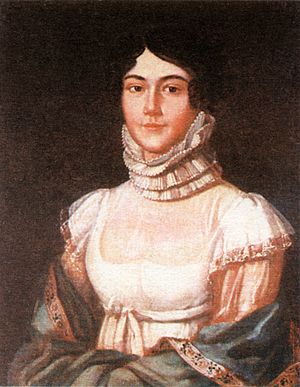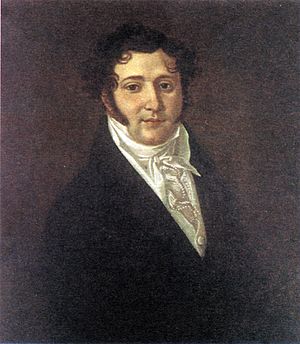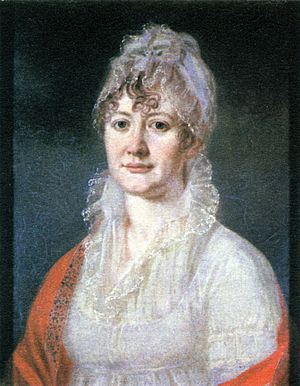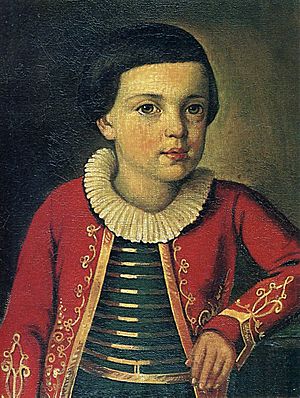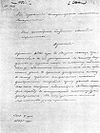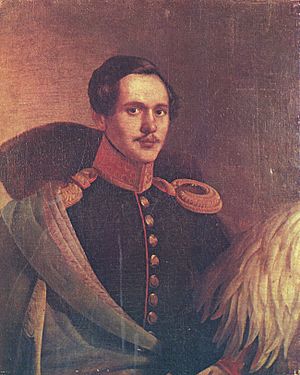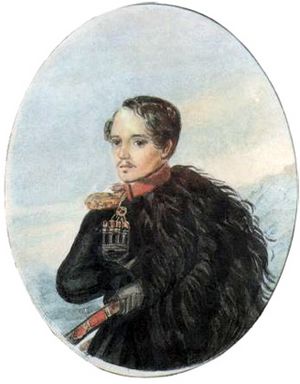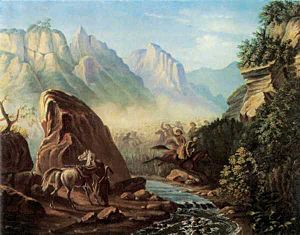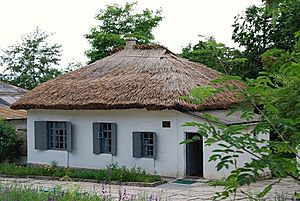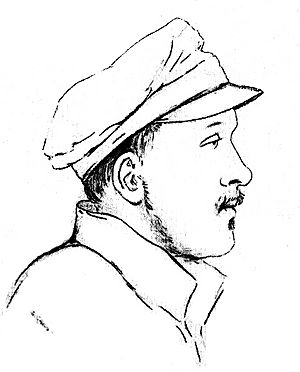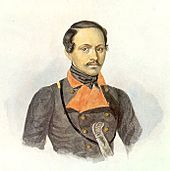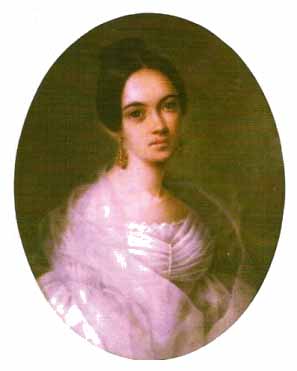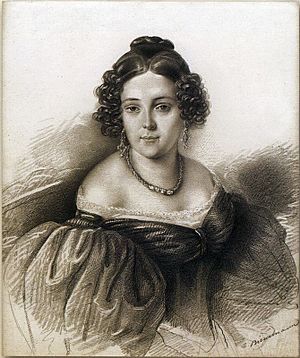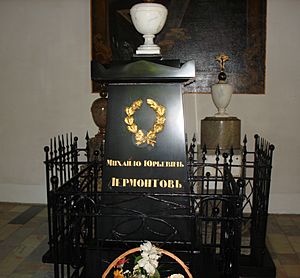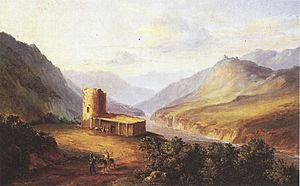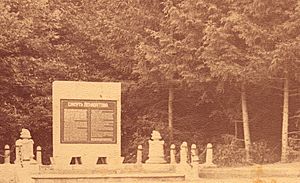Mikhail Lermontov facts for kids
Quick facts for kids
Mikhail Lermontov
|
|
|---|---|
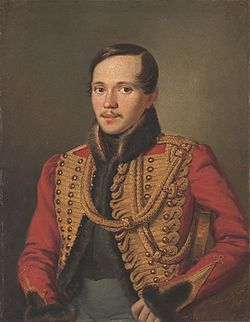
Lermontov in 1837
|
|
| Born | Mikhail Yuryevich Lermontov 15 October [O.S. 3 October] 1814 Moscow, Russian Empire |
| Died | 27 July [O.S. 15 July] 1841 (aged 26) Pyatigorsk, Caucasus Oblast, Russian Empire |
| Occupation | Poet, novelist, artist |
| Nationality | Russian |
| Period | Golden Age of Russian Poetry |
| Genre | Novel, poem, drama |
| Literary movement | Romanticism, pre-realism |
| Notable works | A Hero of Our Time |
| Signature | |
Mikhail Yuryevich Lermontov (born October 15, 1814 – died July 27, 1841) was a famous Russian writer, poet, and painter. He is often called "the poet of the Caucasus" because he loved that region. After Alexander Pushkin died in 1837, Lermontov became the most important Russian poet. He was also a key figure in the Romanticism movement in Russia. His writings, especially his poems and novels, still influence Russian literature today. He helped create the Russian psychological novel, which explores the inner thoughts and feelings of characters.
Contents
About Mikhail Lermontov
Mikhail Lermontov was born in Moscow, Russia. He grew up in a village called Tarkhany in the Penza Oblast region. His family, the Lermontovs, came from a Scottish family called Learmonth. Their ancestor, Yuri (George) Learmonth, was a Scottish officer who settled in Russia in the 1600s. Family stories said he was related to a famous Scottish poet from the 1200s, Thomas the Rhymer.
Mikhail's father, Yuri Petrovich Lermontov, was a military captain. He married Maria Mikhaylovna Arsenyeva, who was only sixteen and came from a rich family. Mikhail's grandmother, Elizaveta Arsenyeva, did not like this marriage. Mikhail was born in Moscow on October 15, 1814.
His Early Life
Mikhail's parents did not get along well. His mother, Maria, became very sick and died when Mikhail was only two years old. She was just 21. After her death, his father and grandmother had a big argument. They decided that Mikhail would live with his grandmother until he was 16.
So, at age three, Lermontov began living a very comfortable life with his grandmother and other relatives. This family disagreement later inspired his early play, Menschen und Leidenschaften (1830).
In 1817, his grandmother moved him to Penza. They returned to Tarkhany in 1821 and stayed there for six years. His grandmother made sure he had the best education at home. He learned to speak French and German fluently. He also learned to play music and was a talented painter. Mikhail rarely saw his father while living with his grandmother.
Mikhail was often sick as a child. He had a French doctor and several tutors. His first tutor, Colonel Capet, was a French prisoner of war who stayed in Russia. A German tutor, Levy, introduced him to famous writers like Johann Wolfgang von Goethe and Friedrich Schiller. Later, an English teacher, Mr. Windson, and a Russian literature teacher, Alexander Zinoviev, also taught him.
To help his health, his grandmother took him to the Caucasus mountains twice, in 1819 and 1820. In 1825, when he was nine, they went a third time. The Caucasus greatly impressed him. He loved its mountains and beauty. He later wrote, "Caucasian mountains for me are sacred." It was there that he felt his first romantic feelings for a nine-year-old girl.
His grandmother tried to keep Mikhail and his father apart, which made Mikhail sad. Even though he was spoiled, he grew up feeling lonely. A German governess, Christina Rhemer, taught him that everyone, even a serf, deserved respect. His poor health also helped him think deeply and find joy within himself.
After his third trip to the Caucasus in 1825, Lermontov continued his studies. In 1827, he visited his father's home in Tula Oblast. That autumn, he and his grandmother moved to Moscow.
School Years
In 1829, at age fourteen, Lermontov joined the Moscow State University's boarding school for noble children. His tutors included the poet Alexey Merzlyakov. He read many books from his large home library, including works by Alexander Pushkin. He even started editing a student magazine. His cousin, Yekaterina Sushkova, said he was "married to a hefty volume of Byron." Lermontov dedicated some of his poems to her.
By 1829, Lermontov had written several early poems. These showed the strong influence of Lord Byron, a famous English Romantic poet. Lermontov's first informal poem, "Vesna" (The Spring), was published in 1830.
Lermontov was very good at drawing caricatures and making clever, sometimes harsh, jokes. He was an excellent student and won first prize for a literary essay in 1828. In April 1830, he left the boarding school.
Moscow University
In August 1830, Lermontov started studying at Moscow State University. He did not join any of the student groups. Instead, he spent time with an aristocratic group. Even they found him a bit distant, but they respected his charm. A fellow student said, "Everyone could see that Lermontov was obnoxious, rough and daring, and yet there was something alluring in his firm moroseness."
Lermontov often read books during lectures and did not participate much in student life. However, he was involved in a big student protest in 1831. A year into his studies, his father died from an illness. This was a great loss for Mikhail, and he wrote poems about it, like "The Terrible Fate of Father and Son."
During this time, Lermontov was interested in European politics. Some of his poems, like "Predskazaniye" (The Prophecy), were political. Other poems from this period, such as "Parus" (The Sail) and "Ismail-Bei," are now considered some of his best.
In his second year, Lermontov had problems with some professors. He decided to leave the university and received a two-year graduate certificate in June 1832.
1832–1837: Military Life
In mid-1832, Lermontov and his grandmother went to Saint Petersburg. He wanted to join Saint Petersburg University, but it was not possible. So, he joined the School of Cavalry Junkers and Ensign of the Guard. This was a military school. He became a junior officer in the Life-Guard Hussar regiment in November 1832. One of his classmates, Nikolai Martynov, who later played a tragic role in Lermontov's life, described him as "far ahead of everybody else."
Military life was challenging for Lermontov. Reading was not encouraged. He took part in physical activities, and once broke his knee in a horse-riding accident, which left him with a limp. He continued to develop his sharp wit and humor, which sometimes made him enemies.
Lermontov kept his writing a secret from most friends. He wrote humorous verses that were published in a school magazine. In July 1835, his poem "Khadji-Abrek" was published without his permission. Many people did not take him seriously as a writer at first.
After graduating in November 1834, Lermontov joined the Life-Guard Hussar regiment near St. Petersburg. His grandmother's financial support allowed him to enjoy high society life. He was known for being witty and intelligent.
He led a double life, keeping his serious writing hidden. He became interested in Russian history and medieval stories, which inspired poems like The Song of the Merchant Kalashnikov and Borodino. During these years, he also finished "Demon" and wrote Boyarin Orsha, The Tambov Treasurer's Wife, and Masquerade, his most famous play. He also met Andrey Krayevsky, who later edited an important journal.
Death of the Poet
When Alexander Pushkin died in a duel in 1837, it shocked Russian society. Lermontov was very upset, especially because many people in high society seemed to support Georges-Charles de Heeckeren d'Anthès, the man who killed Pushkin.
Lermontov was so angry that he wrote a powerful poem called Death of the Poet. The last part of the poem was written very quickly. It blamed the powerful people in Russian high society for Pushkin's death, calling them "hangmen who kill liberty, genius, and glory."
This poem made Lermontov instantly famous. People called him "Pushkin's heir." However, the authorities arrested Lermontov. On February 25, he was sent away to serve as a cornet in a regiment in the Caucasus. During the investigation, Lermontov blamed his friend, Svyatoslav Rayevsky, who received a harsher punishment.
First Exile
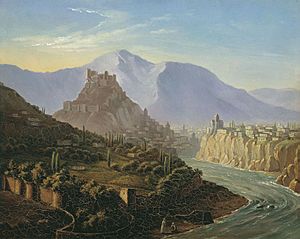
Lermontov felt at home in the Caucasus. He liked the strong people of the mountain tribes and the beautiful scenery. This was also the place he had loved as a child. He was inspired by the nature and local stories. He studied local languages and wrote many beautiful poems. He also painted a lot. He wrote to his friend, "Good people are here aplenty... The mountain air acts like balsam for me." He traveled widely in the Caucasus that year.
Lermontov's first exile was short. Thanks to the help of General Benckendorff, he was moved to a cavalry regiment in Nizhny Novgorod. On his way back, he visited many places and met interesting people. In Pyatigorsk, he met poets and some of the Decembrists, who were revolutionaries. He became friends with Dr. Mayer in Stavropol, who inspired a character in his novel. In Tiflis, he met Georgian intellectuals.
Lermontov's return to the capital was met with great excitement. People saw him as a victim and a rising star. He was welcomed in many important houses and entered a very productive period of his writing career.
In 1837–1838, his poems "Borodino" and "Tambovskaya Kaznatcheysha" were published. His historical poem, "Pesn Kuptsa Kalashnikova" (The Song of Merchant Kalashnikov), was also published after facing censorship. His play Masquerade (1835) showed his observations of high society. His unfinished novel Princess Ligovskaya (1836) was inspired by his love for Varvara Lopukhina. He also helped collect Pushkin's unpublished works.
A Hero of Our Time
In February 1838, Lermontov joined a new regiment in Novgorod. Soon after, his grandmother arranged for him to transfer back to the Hussars Guard regiment in Petersburg. It was there that he began writing A Hero of Our Time. This novel later made him famous as one of the founders of Russian prose.
In January 1839, Andrey Krayevsky invited Lermontov to write regularly for his magazine, Otechestvennye Zapiski. The magazine published parts of the novel, and it became very popular. The story was partly based on Lermontov's own life. It was about a young nobleman who felt bored and unhappy. This novel is now considered a classic of Russian psychological realism.
Second Exile
Lermontov grew tired of the shallow life in Saint Petersburg high society. His bad temper became worse. A lady-in-waiting, Alexandra Smirnova, described him as "insolent to a fault. Dying of boredom, getting vexed by his own frivolousness."
Lermontov's popularity caused jealousy among other men. In early 1840, he insulted Ernest de Barante, the son of the French ambassador. De Barante challenged him to a duel. The duel happened near where Pushkin had died. Lermontov was slightly injured, then arrested and jailed. Vissarion Belinsky, a fan of Lermontov's poetry, visited him in jail.
Thanks to the help of Grand Duke Mikhail Pavlovich, Lermontov received a mild punishment. He was sent back to exile in the Caucasus, to the Tengin infantry regiment. Before he left, he wrote a famous poem, "Tuchi nebesnye, vechnye stranniki" (Heavenly clouds, eternal travelers...). This poem was included in his first book of verse, published in October 1840.
In May 1840, Lermontov left Saint Petersburg. He spent a month in Moscow, where he met Nikolai Gogol and recited his new poem Mtsyri. In June, he joined the army in the Caucasus. He led a unit of Cossack troopers and was very popular with his men.
Lermontov was known for his bravery. Generals Pavel Grabbe and Apollon Galafeyev praised him. In July 1840, he fought bravely in a fierce battle at the Gekha forest, which inspired his poem Valerik.
In early 1841, Lermontov received permission to visit Saint Petersburg. He spent three or four happy months there. He wrote beautiful poems and recited them to friends. His good humor returned.
By this time, both A Hero of Our Time and Poems by M.Y. Lermontov had been published. Lermontov began to take his writing very seriously. He wanted to retire from the army and start his own literary journal. He felt that "The East is a bottomless well of revelations."
However, he could not retire early. Also, his name was removed from a list of officers who could receive awards. In February 1841, an incident at a ball caused trouble for him. He had failed to report to his commanding officer upon arrival, which was a serious rule break. In April, he was ordered to leave the city within 24 hours and return to his regiment in the Caucasus. He asked a fortune teller if he would ever retire. She replied, "You will get your retirement, but of such a kind after which you won't ask for more." Lermontov found this funny.
His Death
After visiting Moscow, Lermontov arrived in Stavropol on May 9, 1841. He then went to Pyatigorsk, saying he was ill. He spent several weeks enjoying himself. He confessed to a friend, "I feel I'm left with very little of my life."
In Pyatigorsk, Lermontov enjoyed his fame as a poet and the success of A Hero of Our Time. He often teased his former cadet school friend, Nikolai Martynov, who dressed like a native Circassian and acted like a romantic hero. Lermontov's teasing became too much for Martynov. On July 25, 1841, Martynov challenged Lermontov to a duel.
The duel happened two days later at the foot of Mashuk mountain. Lermontov reportedly said he would shoot into the air. Martynov shot first and aimed straight at Lermontov's heart, killing him instantly. On July 30, Lermontov was buried without military honors. Thousands of people attended the ceremony.
In January 1842, the Tsar allowed Lermontov's coffin to be moved to Tarkhany, where he was buried in the family cemetery. His grandmother, Elizaveta Arsenyeva, was deeply affected and died in 1845. Many of Lermontov's poems were found in his notebooks after his death.
His Private Life
Lermontov first fell in love in 1825, when he was ten years old, with a nine-year-old girl in the Caucasus. He wrote about this first love seriously, seeing it as a special part of his life. He wrote in his diary, "So early in life, at ten! Oh, this mystery... it will be tormenting my mind till the very grave."
At sixteen, Lermontov fell in love with Yekaterina Sushkova (1812–1868), a friend of his cousin. He dedicated several poems to her in 1830–31.
While at university, the 16-year-old Lermontov fell in love with another cousin, Varvara Lopukhina, who was also sixteen. But her family pressured her to marry Nikolai Bakhmetyev, a wealthy 37-year-old man. Lermontov was "astounded and heartbroken."
Lermontov's love for Varvara Lopukhina was the deepest and most lasting feeling of his life. His unfinished drama Princess Ligovskaya and two characters in A Hero of Our Time, Princess Mary and Vera, were inspired by her.
His Works
During his lifetime, Mikhail Lermontov published only one small collection of poems in 1840. Three more volumes, changed by censors, were published a year after his death in 1841. Even though his writing career lasted only six years, he left behind a huge amount of work: over 30 long poems, 600 shorter ones, a novel, and 5 plays.
Inspired by Lord Byron, Lermontov started writing poetry at age 13. His early poems often featured a "Byronic hero" – an outcast who stood strong against the world.
In the early 1830s, Lermontov's poetry became more personal. Even his love poems, written to Yekaterina Sushkova or Natalya Ivanova, were often based on fantasies.
By 1831, his poems became less like a diary and more like ballads, with clearer stories. Critic D. S. Mirsky called "The Angel" (1831) one of Lermontov's first truly great poems. "The Sail" and "The Hussar" from this period are also considered among his best.
In 1832, Lermontov tried writing prose for the first time. His unfinished novel Vadim was about a peasant uprising. It showed his growing interest in history and folklore.
Lermontov's poems from the early 1830s explored two main themes: Russian Middle Ages history and the Caucasus. The historical poems were serious and direct. The Caucasus poems were rich with colorful images and exciting characters.
Even as a student, Lermontov was aware of social issues. His poem "The Turk's Lament" (1829) showed strong anti-establishment feelings. He also celebrated the July Revolution in his poem "July 15, 1830." However, Lermontov's characters were often rebellious but not always logical or political.
Later, he wrote "Khadji-Abrek" (1835), his first published poem. He also wrote Sashka (unfinished) and Princess Ligovskaya (1836), which explored high society life.
After being exiled to the Caucasus in 1837, Lermontov stopped working on Princess Ligovskaya. His play The Masquerade, written in 1835, was very important to him. He tried hard to get it published. It was influenced by French melodramas and writers like Victor Hugo, but also by William Shakespeare and Pushkin. The play was interesting for its realistic look at high society.
Lermontov's interest in Lord Byron never faded. He took Byron's ideas and gave them a Russian twist, creating a special "Russian sadness." This mix of deep sadness and a strong desire for freedom can be found in Russian folk songs.
In 1836–1838, Lermontov became interested in history and folklore again. Boyarin Orsha (1836) combined Byronic themes with historical drama. The Song of the Merchant Kalashnikov, a historical poem, was praised for its amazing authenticity. Lermontov, who had no academic sources, captured the spirit of folklore perfectly. His Cossack Lullaby became a real folk song.
"Death of the Poet" (1837) made Lermontov famous as "a true heir to Pushkin." His poem "The Thought" (1838) was a critical look at his generation, calling them "servile slaves."
Lermontov's shorter poems ranged from patriotic pieces like "Fatherland" to poems celebrating nature, like "Alone I set out on the road..." Some found his early poems more appealing to teenagers. Later poems, like "The Poet" (1838), showed his doubts about poetry and life. However, in the late 1830s, he also wrote poems like "The Prayer" that showed a clear vision of heaven and Earth.
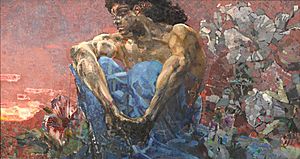
His patriotic and nature poems greatly influenced later Russian literature. For example, Boris Pasternak dedicated his 1917 poetry collection to Lermontov's Demon. This long poem, started in 1829 and finished ten years later, tells the story of a fallen angel. It was banned for many years and became one of the most popular unpublished Russian poems of its time. Even critics who found "Demon" a bit over-the-top admitted it had a magical quality that inspired artists like Mikhail Vrubel.
Another important poem from 1839 was The Novice, or Mtsyri. It tells the sad story of a young monk who chose dangerous freedom over safe servitude. Both "Demon" and "Mtsyri" show the human spirit fighting against a world that tries to trap it.
By the late 1830s, Lermontov even made fun of his own early love for Romanticism in Tambov Treasurer's Wife (1838). However, his historical epic about the 1812 War, Borodino (1837), is seen as a peak of his realism. It tells the story of the victorious Russian spirit in simple language. His poem Valerik is also praised for its realistic battle scenes.
Lermontov had a unique way of developing his ideas. He would try out images and passages again and again in different settings until they found their perfect place in his works.
A Hero of Our Time (1840) is considered Lermontov's greatest work. It is a set of five connected stories about two characters, Pechorin and Grushnitsky, who are driven towards a tragic end. Critic Vissarion Belinsky called it a masterpiece.
In Russia, A Hero of Our Time is still very important. Lermontov's reputation as "Pushkin's heir" is rarely questioned there.
His Legacy
Many things have been named after Lermontov. These include the town of Lermontov, Russia, the cruise ship MS Mikhail Lermontov (launched in 1970), and the minor planet 2222 Lermontov (discovered in 1977).
The crew of the spacecraft Soyuz TMA-21 chose "Tarkhany" as their call sign. This was the name of the estate where Lermontov spent his childhood and where he is buried.
On October 3, 2014, a monument to Lermontov was put up in the Scottish village of Earlston. This was because of the family connection between Lermontov and the Scottish poet Thomas the Rhymer.
Lermontov's life has been shown in many movies and TV shows. In 2012, he was played by Oleg Amirbekov in the Azerbaijani movie "Ambassador of Morning." In 2014, a documentary about him was released in Russia to celebrate his 200th birthday.
See also
 In Spanish: Mijaíl Lérmontov para niños
In Spanish: Mijaíl Lérmontov para niños
- Un cœur en hiver – a film based on a part of "A Hero of Our Time"
- "The Princess of the Tide" – a poem by Lermontov
- Ashik Kerib – a 1988 film based on a short story by Lermontov
- Varvara Bakhmeteva – Lermontov's beloved person and inspiration
- Lermontov (crater) – a crater on the planet Mercury named after him
- Mikhail Lermontov (ship)
- No I'm Not Byron
 | Bayard Rustin |
 | Jeannette Carter |
 | Jeremiah A. Brown |


